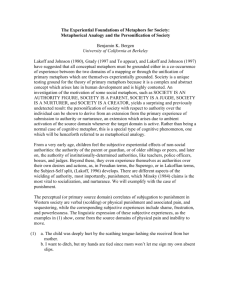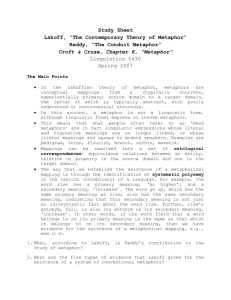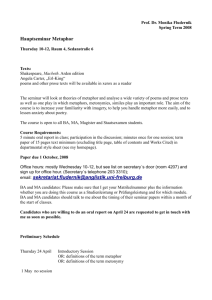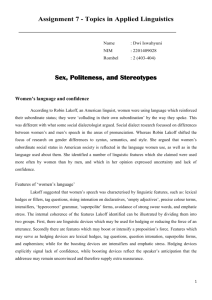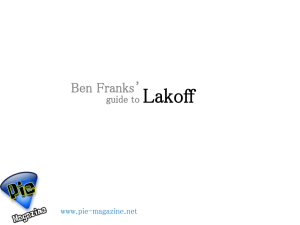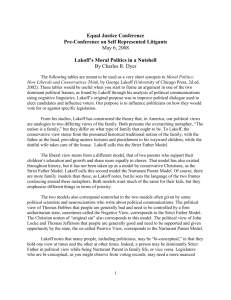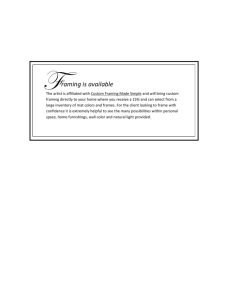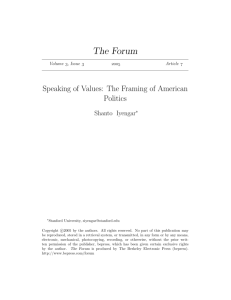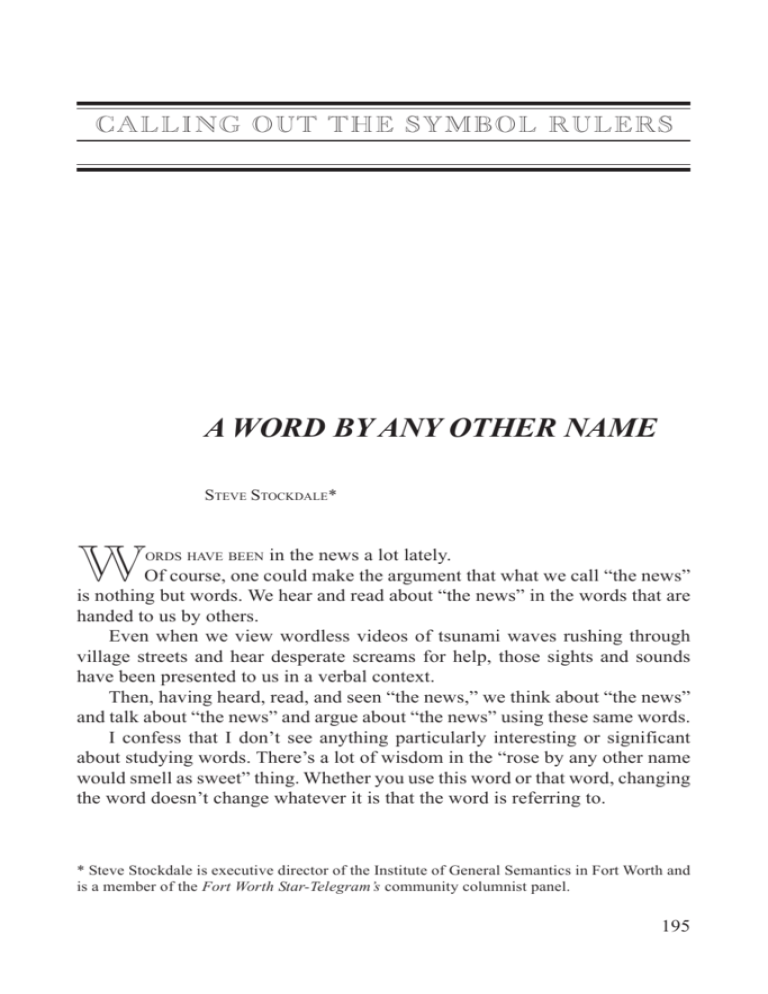
CALLING OUT THE SYMBOL RULERS
195
CALLING OUT THE SYMBOL RULERS
A WORD BY ANY OTHER NAME
STEVE STOCKDALE*
W
ORDS HAVE BEEN in the news a lot lately.
Of course, one could make the argument that what we call “the news”
is nothing but words. We hear and read about “the news” in the words that are
handed to us by others.
Even when we view wordless videos of tsunami waves rushing through
village streets and hear desperate screams for help, those sights and sounds
have been presented to us in a verbal context.
Then, having heard, read, and seen “the news,” we think about “the news”
and talk about “the news” and argue about “the news” using these same words.
I confess that I don’t see anything particularly interesting or significant
about studying words. There’s a lot of wisdom in the “rose by any other name
would smell as sweet” thing. Whether you use this word or that word, changing
the word doesn’t change whatever it is that the word is referring to.
* Steve Stockdale is executive director of the Institute of General Semantics in Fort Worth and
is a member of the Fort Worth Star-Telegram’s community columnist panel.
195
196
ETC • APRIL 2005
However, when people act differently when one word is substituted for
another; when their attitudes change upon hearing a report phrased in certain
language; when a message can be intentionally framed to manipulate how people
will respond to it — now that I find not only interesting but crucially important.
Locally, (Fort Worth-Dallas) the word “meteorologist” has been in the news.
Should someone who reports the weather be allowed to refer to herself as a
“meteorologist” if she doesn’t have a “meteorology” degree? Whether she’s
called a “weather reporter,” a “forecaster,” a “meteorologist” or a “senior staff
meteorologist,” is the title going to change her forecast?
I would argue that the job title doesn’t materially affect the work itself.
What matters is how the viewing public reacts to the words. If Channel X promotes so-and-so as a “weather forecaster” and Channel Y promotes you-knowwho as “senior staff meteorologist whose forecast has the seal of approval of
…,” you can probably guess the results.
It’s possible that a person with a doctorate in meteorology will consistently
make more accurate forecasts than an attractive English major who wants to
become an “on-air personality.” It’s also possible that a mere “forecaster” with
30 years of experience might prove more reliable than a young degreed “meteorologist” who graduated magna cumulus laude.
Is it the quality of the work that matters or the words in the credentials?
Nationally, our political landscape is littered with verbal land mines.
The war in Iraq has popularized the phrase “the situation on the ground.”
We hear reports from foreign correspondents that refer to “the situation on the
ground.” Is there some situation in the war that matters other than “the situation on the ground”?
I believe that this phrase has emerged because it’s a politically correct
euphemism used to distinguish what’s actually happening from what political
leaders want us to believe. On the one hand, we have the language coming out
of Washington about what’s going on in Iraq; on the other hand, there’s “the
situation on the ground.”
In the Social Security debate, we have the phrase “personal accounts” pitted against “privatization.” We have conservatives changing the terms of the
environmental debate from “global warming” to “global climate change.” (It’s
too bad we don’t have a properly credentialed “meteorologist” handy to settle
which phrase is meteorologically correct.)
Last fall, then-Secretary of State Colin Powell made news around the world
when he used “genocide” in relation to the “situation on the ground” in Darfur,
Sudan.
CALLING OUT THE SYMBOL RULERS
197
The appropriateness of the word “genocide” was debated as a factor in how
nations around the world should respond. So far as I can determine, nobody
disputes the assertion that government-backed janjaweed militias are committing atrocities against the people of western Sudan. But it seems as though the
international response is conditioned by a word: If it’s “genocide,” we do X; if
it’s not “genocide,” we can get by with just Y.
More than 70 years ago, the author of a book titled Science and Sanity
forecasted that “those who rule the symbols rule us.”
We are confronted every day by those who seek to “rule” our thoughts,
attitudes, and behaviors. From frivolous advertising to ratings-driven television to global propaganda, we are bombarded by persuasive words, images,
and symbols.
The challenge as I see it is: Who rules your symbols?
Originally published in the Fort Worth Star-Telegram on Saturday, February 26, 2005.
Copyright © 2005 Star-Telegram and wire service sources. All Rights Reserved.
http://www.dfw.com
198
ETC • APRIL 2005
CALLING OUT THE SYMBOL RULERS
RHETORIC OF
BUSH SPEECHES:
Purr Words and Snarl Words
GREGG HOFFMANN*
P
George W. Bush has, to put it in terms used by S.I. Hayakawa,
learned to purr when some of his policies might make opponents snarl.
Hayakawa wrote about the use of purr words, terms that make people feel
good about the subject being addressed and even at times the speaker, and snarl
words, terms that make people react negatively.
These terms, on both ends of the spectrum, are usually on a fairly high
order of abstraction. They might even represent higher order ideals, which are
difficult to define and vary from user to user. Specifics and operational definitions are usually lacking. You have to work to bring these terms down to lower
levels of abstractions by asking, “What do you mean?”
In both the State of the Union address and his inaugural speech, President
Bush loaded up on purr words, but used snarl terms when talking about terrorists and others he opposes.
RESIDENT
* Gregg Hoffmann is a veteran journalist and retired senior lecturer in journalism and media
literacy at UW-Milwaukee. He covers politics and business for Wispolitics.com and
WisBusiness.com. His book, Mapping the Media, deals with snarl and purr words.
198
CALLING OUT THE SYMBOL RULERS
199
Purrrring
As a new Congress gathers, all of us in the elected branches of
government share a great privilege: We have been placed in office by
the votes of the people we serve. And tonight that is a privilege we
share with newly elected leaders of Afghanistan, the Palestinian
territories, Ukraine, and a free and sovereign Iraq.
Two weeks ago, I stood on the steps of this Capitol and renewed the
commitment of our nation to the guiding ideal of liberty for all. This
evening I will set forth policies to advance that ideal at home and
around the world.
Certainly, Bush looks modest and humble when he talks about a great privilege. That privilege of serving is extended to a free and sovereign Iraq.
Bush reminds us that he renewed the commitment of our nation. To what
you might ask? Well to the guiding light of liberty for all. And, in his speech,
he set forth plans for policies that advance that ideal at home and around the
world.
All the boldfaced terms have positive connotations. They are intended to
make us feel good about our humble leaders, our nation, and ourselves. Who
can argue with a country being free and sovereign?
A country that makes a commitment demonstrates courage and compassion for others. And, who wouldn’t follow a guiding light of liberty?
You could fill this entire issue of ETC with such terms from just these two
of Bush’s speeches. But, when you start to search for the terms’ referents, to
bring the language down to a lower level of abstraction, you have to start asking some questions.
When Bush says he was placed in office by the votes of the people he
serves, is he acknowledging the sovereignty of all voters, or just those who
elected him? Is it more of a privilege for Republicans to serve their constituency than for Democrats to serve theirs, in Bush’s set of priorities? Most experts say the election in Iraq is only a first step. The 275 people elected are in
office primarily to write a Constitution and then hold another election. Insurgents still blow up people and things daily. Freedom from fear, economic
struggles, and clashes of ethnic sub-cultures seems a long way off.
As for the commitment of our nation, some would argue we are over-committed, as we slip deeper into debt at least in part because of the cost of the war,
while more American soldiers die each week.
200
ETC • APRIL 2005
When you analyze the guiding light of liberty for all, you have to ask questions like: Who’s holding the light? What form will liberty take in various countries? Will we impose our form of government on countries in the name of
liberty? Later in his speech, Bush addressed the latter question when he said the
goal was not to force countries to adopt our government style. Will his actions
reflect this intention or the one implicit in his earlier statement?
The last bold-type statement above, the one about policies that “advance
that ideal [of liberty for all] at home and around the world,” might require the
most questioning. Just how does Bush plan to advance that ideal, which remains rather vaguely defined, at home and around the world? Will he use military force in Iran and Korea? Will we support totalitarian regimes in some nations, such as in Saudi Arabia, and condemn them in others? Will we open
schools in Iraq and elsewhere while closing them in this country? At home, will
we “fix” Social Security and deplete the fund more quickly than it is dwindling
now?
When you ask these questions, you often leave yourself open for accusations of political bias. But, that should not deter you. Asking the critical questions, especially those that start with who, what, when, where and why, is the
start of taking control of the symbols of political rule rather than allowing politicians, be they Republicans or Democrats, to use them to manipulate you.
Snaaarling Too
Bush also used his share of snarl words. For example:
In the long term, the peace we seek will only be achieved by eliminating the conditions that feed radicalism and ideologies of murder. If
whole regions of the world remain in despair and grow in hatred, they
will be the recruiting grounds for terror, and that terror will stalk
America and other free nations for decades.
The only force powerful enough to stop the rise of tyranny and terror,
and replace hatred with hope, is the force of human freedom.
Radicalism and ideologies of murder are not good things. Thinking about
them can scare you. Of course, both Republicans and Democrats tried to convince you last fall that they could best protect you. George W. was apparently
more convincing.
CALLING OUT THE SYMBOL RULERS
201
Despair, hatred, tyranny and terror also are scary things. And, who wants
to be stalked? But, hope and human freedom, a couple of purr words, can
eliminate all those nasty things. We’re just not sure yet of exactly how.
It’s hard to disagree with ideas formulated by these rather vague terms.
They are examples of affective language, designed to appeal to emotions, which
often can be very effective in swaying public opinion and manipulating thinking and feeling.
Visual language can also be very effective in manipulation. Perhaps the
most moving part of the State of the Union speech came with the embrace
between the Iraqi woman and the American mother who had lost her son in the
war. It looked genuine and spontaneous.
But, if I might exercise my cynical side, was it coincidence that the two
women sat a row apart? I think not. And, does it make you uncomfortable when
people who have gone through pain and suffering are used as symbols by any
politician? It’s become a regular technique in these big speeches.
Neither Bush’s State of the Union nor his inaugural speech was strong on
details. You didn’t really learn how he plans to “fix” Social Security, reduce the
deficit, provide affordable health care, or exit from Iraq without leaving a civil
war behind.
Some of those details will be included in the actual proposals Bush sends to
Congress, in the priorities of his budget and his actions as Commander in Chief.
They won’t be as evident as the rhetoric in his speeches. You’ll have to dig into
media reports, and perhaps even beyond them to access actual administrative
and legislative proposals on line or available through the Library of Congress.
How many of you will actually take the time to do that? Not many. Politicians, not just George W. Bush, but others too, know that. They leave the details
to the insiders, and use snarl and purr words to spin their ideas and sway public
opinion.
202
ETC • APRIL 2005
CALLING OUT THE SYMBOL RULERS
THINKING INSIDE THE FRAME
NORA MILLER*
O
NE OF THE few bright spots for me in the recent presidential election ordeal
came when I first read about framing in a UC Berkeley News interview
with George Lakoff. (Powell, 2003) The information didn’t change the outcome
of any race, as far as I know. But for me, and I think, for general semantics, the
work of the cognitive scientist and linguist from Berkeley promises some deeply
significant reverberations.
Lakoff has a curriculum vitae appropriate for someone in his position in the
world of linguistics — fellowships, visiting professorships at international institutions, a long list of published research. For my purposes, his most significant work deals with his growing theory of the role of metaphor in daily language and culture. Historically, most linguists and philosophers relegated metaphor to the realm of creative writing, useful for eliciting emotional responses,
but not relevant to the study of meaning. Lakoff has developed a model of
metaphor in which metaphors serve a much deeper and more integral purpose
in daily language, perception, and thought — namely, to provide a frame for
understanding abstract aspects of life in terms of concrete, familiar objects and
activities. A metaphor comes equipped with a small constellation of related
* Nora Miller, Assistant Editor of ETC, lives near Portland, Oregon, where she has undertaken
to discover what joy may come from the form of living called “early retirement.” This involves
technical support for a small government website, freelance editing, writing and photography,
taking care of an also-retired significant other, and looking for sun wherever she can find it.
202
CALLING OUT THE SYMBOL RULERS
203
terms that put flesh on the abstract target, enabling a more certain and complete
transfer of meaning. Metaphors put hard-to-grasp abstract concepts in terms of
familiar concrete images.
For example, I could tell you that I can really sink my teeth into your idea.
Because you understand eating, you get the benefit not only of the basic metaphor that “thought is food,” but also the related notions that “thought is nourishing,” “good thoughts are satisfying to consume,” etc. I don’t have to say any
of those things, but you know them nonetheless. These metaphoric constellations generally function without our awareness. Indeed, most of us would have
a hard time coming up with a single, fundamental metaphor that governs our
language, even though we can recognize metaphors immediately once we hear
them. Lakoff gives us many examples in Metaphors We Live By: “Good is up.”
(p.16) “Argument is war.” (p.4) “Love is a journey.” (p.44) We use metaphors
so instinctively we might say “they are just a part of the language.” But while
some more basic metaphors, based on the physical nature of humans in the
environment, figure in nearly all languages, according to Lakoff, many differ
from culture to culture. They belong to the cultural fundament, not to the natural world. (pp.39-40). (Where have we heard that before?)
So what does all this have to do with elections?
According to Lakoff, everything — assuming by “everything” you mean,
who votes, why they vote and who wins and loses. As the political campaigns
started up their organ grinders in late 2003, Lakoff found himself wondering
why Democratic Party issues didn’t generate more votes in swing states. The
Davis-Schwarzenegger election in California produced some alarming and perplexing data on voter behavior. After hearing a carefully non-partisan description of the platforms of each candidate, voters generally rated Davis’ plan as
more likely to favor their personal economic situation. But when asked their
likely choice for governor, they generally picked Schwarzenegger. Lakoff wondered why and applied his theory of metaphor and meaning to see if he could
come up with an explanation. He thinks he found one.
In Don’t Think of an Elephant, his recent best seller, Lakoff claims that
Schwarzenegger won in part because his personality, his celebrity, his movie
career, his very body, personify the conservative Republican ideal of the strong
father. (p.42) Arnold “was” the metaphor. With that metaphor comes the constellation of adjunct meanings, like security, discipline, comfort, certainty, and
control. If you ask most Californians if they want a disciplinarian for a governor, they might hesitate. But with someone like Schwarzenegger running for
the office, you don’t have to ask and the voters don’t have to answer. His presence activates the frame of the strong father and the voters bask in the appeal of
the parent who will take care of all their problems for them.
204
ETC • APRIL 2005
Davis on the other hand, presented a blurred, indefinite, almost disturbing
message, thanks in part to the way the media framed him, and in part to his own
choice of campaign tactics. Lakoff contends that Davis made the same mistakes that the entire party has made for the past several years at least — arguing
defensively against a much more certain opponent using the opponent’s language, thereby reinforcing the opponent’s frame and losing the argument in the
process.
Conversely, metaphors can also obscure or negate facts that don’t fit into
the metaphor. If I want to promote a TV show by telling you that it will “feed
children’s brains,” I rely on the “thought is food” frame to trigger the “thought
is nourishing” concept, while not having to address the issue of what the show
might make children think about. A metaphor makes a concept easier to grasp,
but it does not necessarily tell the whole story and it may very well tell a false
story.
It works like this: say you want voters to eliminate the estate tax. Now
factually, the estate tax affects a miniscule percentage of the population — in
1997, 98 percent of estates were not required to pay any tax at all. (Gale and
Slemrod, p.2) When the Republican Party decided to promote the repeal of this
tax (part of a larger strategic policy to rearrange the mechanisms of wealth
transfer) they needed a new frame. As Frank Luntz put it in the PBS Frontline
episode, “The Persuaders,” “nobody really knows what an estate is, but they
certainly know what it means to be taxed when you die.” So the Republican
machine changed the frame by changing the name — the estate tax became the
“death tax.” Now, even though 98 percent of people will never pay this tax, and
despite the fact that in 1997 this tax generated $28 billion dollars from a mere
45,000 estates, now most people polled favor repeal of this tax, because “taxing
at death is immoral.” (p.4)
Lakoff, in collaboration with the Rockridge Institute, wrote Don’t Think of
an Elephant primarily to educate the Democratic Party on the use of framing.
The project evolved from an issue paper on the Rockridge website titled “Simple
Framing” in which Lakoff presents the following “moral principles” of framing:
1. Every word evokes a frame — every word brings with it related concepts and images. If I say “cat” you immediately have at your mental
fingertips a wealth of associations: paws, purring, petting, bad luck,
chasing mice, etc., etc.
2. Words defined within the frame evoke the frame —the word “purr”
in the sentence “Tommy purred and twitched his tail” evokes the
“cat” frame and you can tell Tommy is probably a cat without my
saying so.
CALLING OUT THE SYMBOL RULERS
205
3. Negating a frame evokes the frame — “Don’t think of a cat” paradoxically requires you to think of a cat in order to “not” think of it.
4. Evoking the frame reinforces the frame — because of the way the
brain works, every time the “cat” circuit is activated, it becomes stronger. Even negative references to a frame reinforce the life of the frame,
making it seem ever more familiar, acceptable, “real.”
You can detect these “moral principles” in many of the political mechanisms of the Republican Party, which has spent millions of dollars in recent
decades for research on and development of effective use of language. The
resulting elections won and legislation passed has for me validated Lakoff’s
theory.
Why should the world of general semantics take notice of this theory?
First and most obviously, framing concerns language, and we have an interest in anything that brings consciousness of language use to the public’s
attention. One of the two major parties has begun a fundamental, nation-wide
discussion of how the words politicians use can influence the way voters evaluate the issues that should decide elections. The other major party has apparently
known about framing for years and has quietly institutionalized it into their
national and local organizations. Something that has changed political language
this extensively demands our attention and study.
Second, the principles of framing, as described by Lakoff, make use of
certain formulations of general semantics, and we might want to consider the
implications of this coincidence. For example, we might word the four moral
principles this way:
1. The definition of a word depends on the organism-as-a-whole-in-itsenvironment. A word does not exist in a vacuum but relates to many
other words and images for its comprehension. (A word evokes a
frame.)
2. You understand a word on the basis of a mental map, and you bring
to bear the entire map on the matter of understanding. (Words defined within the frame evoke the frame.)
3. Using a word, regardless of purpose, involves traversing the map
you use to understand the word. (Negating a frame evokes the frame.)
4. Mental processes build mental habits. The repeated use of a word
can lead to familiarity and familiarity can obstruct consciousness of
abstraction. (Evoking the frame reinforces the frame.)
206
ETC • APRIL 2005
Thinking of frames in terms of maps reminds us that the frame cannot convey “all” about the subject any more than the map can fully convey the territory
it represents.
I think we could say that Lakoff’s publicizing of the issue of metaphoric
framing encourages consciousness of abstracting and delayed reactions. Knowing that politicians or newscasters might use selected words to evoke a frame
that will influence your ability to evaluate their messages gives you some chance
of avoiding the immediate reaction in favor of a more considered, and possibly
contrary, opinion.
For general semantics, as a subject of study and as a tool for personal growth,
Lakoff’s model represents an interesting and useful development. I submit that
we will benefit from following the development of his work and from observing any influence the theory of framing may have on the political language of
tomorrow.
NOTE
As a sign that the Democratic Party has come to see the value of Lakoff’s
insights on language and framing, we note the recent election of former
Presidential candidate Governor Howard Dean as the new chair for the
Democratic National Committee. Dean has promoted Lakoff’s framing theories
within the party and in his election suggests that we can expect more from the
Democrats on this subject in the future.
REFERENCES
Gale, W., and Slemrod, J. “Resurrecting the Estate Tax.” Policy Brief, 62,
Brookings Institute, Washington, DC, 2000.
Lakoff, George. Don’t Think of an Elephant: Know Your Values and Frame
the Debate. 2004. White River Junction, VT: Chelsea Green Publishing Co.
Lakoff, George. Metaphors We Live By. 1980. Chicago: University of Chicago
Press.
Lakoff, George. “Simple Framing.” 2003. Rockridge Institute. See http://
www.rockridgeinstitute.org/projects/strategic/simple_framing.
Powell, Bonnie. “Framing the issues.” UC Berkeley News. 27 October 2003.
Also at http://www.berkeley.edu/news/media/releases/2003/10/27_lakoff.
shtml.
“The Persuaders.” FrontLine. PBS. 9 November 2003. Transcript. See http://
www.pbs.org/wgbh/pages/frontline/shows/persuaders/etc/script.html.

